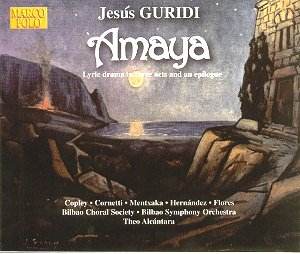Jesús GURIDI
Amaya
Lyric Drama in three acts and an epilogue
Basque libretto by Fr. José de Arrué
after the novel by Navarro Villoslada
 Marco Polo CD box set:
8.225084/85 [2 hr 17
min]
Marco Polo CD box set:
8.225084/85 [2 hr 17
min]
Crotchet
AmazonUK

Amaya - Rebecca Copley, Amagoia - Marianne Cornetti,
Plácida/Olalla - Itxaro Mentxaka, Teodosio - César
Hernández, Asier - Rosendo Flores, Miguel/Messenger/2nd
Squire/2nd Shepherd - Carlos Conde, Uchin/1st Shepherd/Servant/A Voice
- Angel Pazos, An elder - Gorka Robles
Bilbao Choral Society (Gorka Sierra, Chorus Master), Bilbao Symphony
Orchestra,
conducted by Theo Alcántara
Jesús Guridi (1886-1961) is not at all widely known beyond his native
Spain, so this recording of one of his major works has to be a welcome addition
to the catalogue. He is certainly an important figure in 20th century Spanish
music, best known internationally for his songs (Teresa Berganza featured
some of them on her recent British tour, for example), but he wrote several
operas and the larger scale forms were probably his artistic priority.
Having said that, this opera - Amaya - stands practically no chance of entering
the international repertory, despite the high quality of its music. The reason
is the language, for it is sung here in the original version, which is in
Basque dialect. All credit, then, to the efforts of the mixed Spanish-American
cast for learning their parts so thoroughly, in order to produce so fluent
and committed a performance.
The story-line concerns the ancient, perennial conflict between the Christians
the the Moors, alongside the conventional operatic tension between love and
duty: who will win the love of Amaya? Completed in 1920, the opera is based
on the stuff of legend, with a musical style that is unashamedly Wagnerian,
the orchestra holding the bulk of the melodic interest, and the singers
delivering a dramatic parlando and arioso, as the case may be. The most
compelling part of the score, the dance ensemble which builds powerfully
towards the end of the Second Act, uses the local flavour of Basque folk
music. Surely this is no coincidence.
The performance is Bilbao-based, and acquits itself well. The singing is
generally good, though not outstanding, and Theo Alcántara directs
with a sure sense of ensemble and line. The recording likewise is more than
adequate, though it is by no means a sonic spectacular. Since you will not
glean much information from other sources - even the new New Grove - the
booklet takes on an extra importance. And it is certainly informative, with
an introductory general essay, a full synopsis and texts and translations.
However, the print is very small (ie smaller than usual, even for CD notes)
and some of the printing is very faint. So do check before you buy.
Terry Barfoot
See further review and detailed discography
by Christopher Webber

